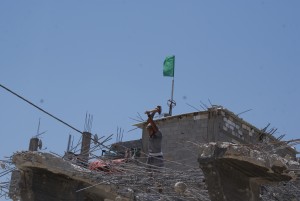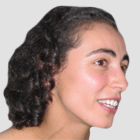More to life than window dressing
Badra Djait, an advisor to Flemish Integration Minister Marino Keulen, was born and raised among Gent's small but close-knit Algerian community. Here, she recounts what it was like growing up as a woman in two cultures and traditions.
As a Fleming of Algerian origin, I was born in Belgium and am the eldest of seven children. I feel as Flemish as I do Algerian.
My story begins when my father immigrated to France in the late 1950s, where he worked in the mines. Some years later, he decided, along with a friend, to get on his bike and come across the border to Gent in Belgium, where he took up work in a factory.
He was welcomed by the locals on the historic St Baaf's square where he was immediately invited to a wedding. In those days, the ‘foreigner' and ‘immigrant' labels – which have gained such negative connotations in the intervening years – did not really exist. My father was seen as an exotic curiosity.
Some time later, my father brought my mother to Belgium from the newly independent Algeria. And that is where they started their family, raising six daughters and one son.
At school, it soon became apparent that our schoolmates, or we, were sometimes ‘different'. I recall how my sisters and I would colour ourselves in orange, while the local girls would use pink. We found that really weird. For us, pink was the colour of piglets. Who wanted to be associated with those animals? Wasn't that haram (sinful) or something?
We were called the zwartjes (‘blackies') or negertjes (‘little niggers'). Could they really not see that we were not black and had, at most, a light tan? We still hear this typical story from recent immigrants.
Not all the stories from our childhood were amusing, we were also faced with less pleasant experiences. The bus would routinely drive straight past my mother and us children without stopping, not because we were dressed in ‘ethnic clothing' (read: headscarf), but because we had the wrong skin colour. Has this influenced our lives fundamentally? No, not really.
As we grew up, my parents began to get stricter in their upbringing of my sisters and myself. They imposed greater limits on our freedom in comparison with our local girlfriends. Daughters should not be seen playing outside and should stay home to help with the housework. Daughters did not go to the cinema and they could not speak to boys.
It quickly became apparent that Muslim girls in Europe have two basic choices to gain their coveted freedom: marriage or studying. Many young Muslim women dream of marrying their prince charming and it is a popular subject for conversation. Whereas this was rarely or never a talking point with my local girlfriends, my Algerian friends often dragged me along to some bridal shop.
It didn't surprise me when I read in a newspaper, many years later, that a bridal shop located in an immigrant neighbourhood with a large Muslim population in Antwerp had decided to charge clients who wanted to try on wedding dresses. Alas, dreaming comes at a price!
Naturally, I chose to study. A decent education leads to employment and financial independence which brings with it the prized reward of freedom. “Without money, you have to stay home and have no business outside the house” was our motto.
When it came to my studies, my parents were very supportive. They were both illiterate and they wanted to give us the chances that they had been deprived of in colonised Algeria.
I studied at a Catholic girl's school and grew up in surroundings where it was common practice to go on to university. Moreover, higher education is becoming increasingly essential as Belgium evolves into a knowledge society where the highly educated play a central role in the globalised economy. The era of low-skilled and technical labour has clearly passed as these jobs migrate to low-income countries.
At university, I studied Arabic and Islamic studies as a first degree and then went on to do a diploma in social and cultural anthropology. My passion for the Arabic language and Islamic culture was born there.
After finishing my studies, I quickly found a job. My skin colour and origin were actually not major obstacles in my search for work. After a few years as a researcher at Leuven University, I sent an unsolicited application to the newly elected Integration Minister Marino Keulen.
I did not only want to map the problems of people of foreign origin through scientific analysis, I also wanted to do something concrete in the field. This could be achieved by entering the policy sphere. Three weeks after I sent off my application, I was taken on as a cabinet adviser to the minister.
By the way, I am no window dressing. I am not the token woman in his cabinet; I am no Excuus Truus, as we call it in Dutch. My function is anything but a hollow box and the tasks assigned to my job carry the necessary responsibility. I point this out explicitly because of what happens when I meet ‘family' in Belgium and northern France (in Europe, all Algerians call each other family – walad al-'aam, i.e. cousin).
When I tell other Algerians what I do, they react with surprise and doubt. Many have an almost automatic belief that employers are racist and so will never give real chances to people with a foreign skin colour. What I notice is that people like that tend to cast themselves in the role of ‘victim' rather than looking in their hearts and believing in their own abilities.
What are the prerequisites for progress? Self-belief and confidence in your own qualities. People should not transpose and superimpose their negative experiences in every domain of life, but should, instead, draw lessons from them. It's important to be positive and to dare to trust in the integrity of others.
How have I managed to reconcile my Algerian and Flemish identities? I think it is mainly because I have not only been given opportunities by society but have succeeded in creating my own. Every step I take is, and remains, an individual and free choice. In other words, you have to pave your own yellow brick road out of Oz.



Pingback: Het pad naar persoonlijke onafhankelijkheid - The Chronikler